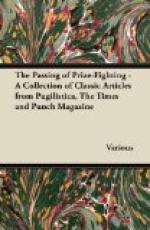* * * * *
[Illustration: Eminent London Architect (submitting his designs to our Village Victory Memorial Committee and warming to his work). “...AND, SURMOUNTING THE WHOLE, A GRACEFUL FIGURE OF VICTORY, WITH WREATH—SO.”]
* * * * *
THE COALITION OF 1950.
“Aren’t you being rather badly hit by the price of tobacco?” I asked Charles, whose pipe is a kind of extra limb to him.
“I have just been composing the plot of a novel,” he replied with apparent irrelevance. “It begins something like this:—
“’Slowly and softly the violet dusk set in. The beautiful young Premiere stood at the window of her yellow-and-black boudoir, gazing a little wistfully at the almost deserted pavements of Downing Street. A white pigeon perched—’”
“They aren’t white,” I said; “they’re a sort of purply pinky grey.”
“All right,” said Charles, unmoved, “only it rather spoils the sentence. ’A sort of purply pinky grey pigeon perched pompously—’”
“Never mind the pigeon,” I said, “tell me what was the trouble with the B.Y.P.”
“A change in the leadership of the Opposition. The old leaderess had just retired and her place had been taken by a new one, a man this time, young and handsome as Apollo, who had thrown up the Chair of Cinematography at the London University to plunge on to a political platform.”
“What was the programme,” I inquired, “of this—er—furniture-remover?”
“He was a reactionary,” said Charles. “The Premiere’s party had won a not too sweeping victory at the polls on prohibition (not of alcohol, of course—that had been done long ago—but of tobacco).”
“How on earth did she do it?”
“National economy, mostly,” answered Charles. “She had the wives’ vote solid, and they carried the more docile of the husbands with them. She had to throw out bribes to the unmarried electorate of both sexes, of course, bribes which she had since been attempting to pay. Powder and chocolates had been made cheaper. There was the Endowment of Cinemas Act of 1948, and the Subsidized Football Bill of ’49. But all these extravagances had largely ruined the effect of the abolition of tobacco. At the beginning of that year she had been obliged to cancel the State holiday on Mondays—”
“Why Mondays?” I inquired.
“Everyone feels beastly on Monday.”
“But I don’t see why they should feel any better on Tuesday.”
“It was twenty-four hours nearer Saturday,” he replied, “and Saturday was also a State holiday. Labour, of course, was infuriated, and unrest was every day becoming more apparent. The by-elections were going against the Premiere. And now this new handsome young hero had arisen not only to crystallise the support of his own sex, but capture the hearts of all the female electorate under twenty.”




